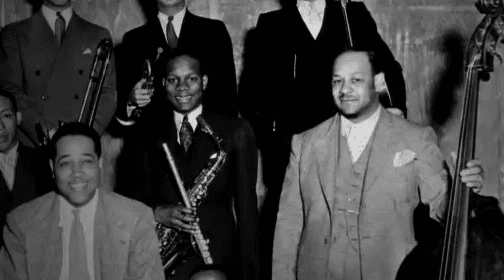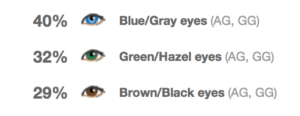 “Musical Royalty”: Watch the video from the PBS series Finding Your Roots with Henry Louis Gates, Jr., as he speaks with Branford Marsalis about his relative Wellman Braud, a pioneering jazz bassist.
“Musical Royalty”: Watch the video from the PBS series Finding Your Roots with Henry Louis Gates, Jr., as he speaks with Branford Marsalis about his relative Wellman Braud, a pioneering jazz bassist.
Just as jazz greats Harry Connick Jr. and Branford Marsalis wondered, in the first segment of the PBS series Finding Your Roots, whether they had musical ancestors, you too might wonder where you got your penchant for painting or your bright blue eyes.
Many traits, as you might imagine, are complicated – is someone a musician because of innate, and possibly genetic ability, or because of her environment? Are you outgoing or shy because of your genes, or because of how you grew up? In most cases it is likely a combination of both, but that may make it even more interesting to learn that your ancestors shared certain qualities you see in yourself, whether it be a special talent or a streak of stubbornness.
Family Traits
For some traits, it can be easy to see a resemblance. Many of us have gazed at old, faded photographs of our parents or grandparents (or more distant relatives, if we’re lucky!) in their younger years and marveled at how we can see ourselves in them. The connection can be something obvious, like wild unruly hair or a distinctive shape of the nose, or it can be as subtle as a smile.
Because of genetic discoveries, you can trace a few such traits through your DNA. Those bright blue eyes could be due to specific factors located in genes responsible for pigment, passed down through generations. Or, if you’re Asian, you might look around the table at family holidays and see the pink-flushed cheeks that accompany a glass of wine – also a trait known to have a genetic basis. Does your mother’s father have male-pattern baldness?
If you’re a man, chances are that you’ll inherit this trait as well.
Perfect Pitch
 If they carry one particular genetic variant, two individuals with brown eyes can have children with almost any color eyes.
If they carry one particular genetic variant, two individuals with brown eyes can have children with almost any color eyes.
Research on the specific musical ability called “perfect pitch” suggests that this ability to recognize and produce musical tones is the combination of innate potential and early training. But we don’t yet know which genes are involved.
Indeed, no one has discovered much about the genetics of traits like artistic ability or personality. Why hasn’t anyone figured these out yet? Researchers have certainly searched for genetic contributions to handedness, personality, and musical ability.
But it may be that the genetic models we assumed in those studies were too simple.
Genetic Models
In one common type of genetic study, researchers compare two groups of people — those with a trait (say, perfect pitch) and those without. They step through a million or more genetic “markers” or positions throughout the genome, and ask at each step, “Do the people with perfect pitch have more of one version of this DNA marker than do the people without perfect pitch?”
This approach works well if many of the people with perfect pitch have the same genetic variant, and that variant influences the trait strongly. This doesn’t seem to be the case for many traits, however.
Bigger Studies
![]()
23andMe customers can see what traits they and a potential partner might pass on to their children.
Not yet a customer? Visit our store or learn more about the Personal Genome Service ®.
Two things will help researchers discover the genetic factors behind those traits we see shared in families. First, studies that include a very large number of people with and without a given trait will help us find common genetic factors that have even a small influence on the trait.
By involving tens of thousands of people in studies, researchers have recently discovered genetic variants that influence freckling, sneezing in bright sunlight, and whether or not someone has a sweet tooth.
More Genetic Data
Second, a trait such as the love of vinegar and lemons that you share with your cousin may be influenced by genetic variants that are unique to your extended family. In that case full genome sequencing – that is, examination of all 3 billion positions in the genomes of a few family members – would be needed to get to the bottom of the family mystery.
DNA can tell us a lot about our ancestors and where we came from, and it turns out that it can also tell us a bit about why we’re the way we are. Perhaps that trait you share with someone in your family tree comes from a little shared DNA.